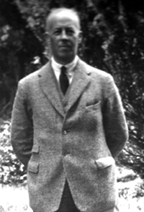Robert Childers Barton
Robert Childers Barton ( Irish Riobárd Bartún , * 1881 in County Wicklow , † August 10, 1975 ibid) was an Irish lawyer, politician and landowner. He was one of the negotiators for the 1921 Anglo-Irish Treaty .
Life
Barton was born to a wealthy Protestant landowning family. His father was Charles William Barton and his mother Agnes Childers. He was the first cousin of Robert Erskine Childers . Barton was married to Rachel Warren, the daughter of Fiske Warren .
After training in rugby and Oxford , he became an officer in the Royal Dublin Fusiliers when the First World War broke out . He was stationed in Dublin during the Easter Rising in April 1916 . As a sign of protest against the fierce British backlash to the uprising, he renounced his officer position and joined the republican movement.
In 1918 he was elected to the British Parliament for Sinn Féin in the West Wicklow constituency. Like other Sinn Féin representatives, he did not accept his mandate and instead went to the first Dáil Éireann , the Irish parliament. In February 1919 he was jailed for sedition, but escaped from Mountjoy Prison in Dublin on St. Patrick's Day . He was arrested again in January 1920 and sentenced to three years in prison. As part of a general amnesty in July 1921, he was released early.
Barton was then appointed Minister of Agriculture of the Republic of Ireland, then Secretary of State. In 1921 he was elected to the second Dáil. He took part in the negotiations for the Anglo-Irish Treaty. Reluctantly, he signed the contract that same year. During the Irish Civil War he sided with Eamon de Valera .
In June 1922 he was elected to the third Dáil, but did not accept his mandate and left politics. He became a judge; from 1934 to 1954 he was chairman of the Agricultural Credit Corporation .
Web links
| personal data | |
|---|---|
| SURNAME | Barton, Robert Childers |
| ALTERNATIVE NAMES | Riobárd Bartún |
| BRIEF DESCRIPTION | Irish politician and lawyer |
| DATE OF BIRTH | 1881 |
| PLACE OF BIRTH | County Wicklow |
| DATE OF DEATH | August 10, 1975 |
| Place of death | County Wicklow |
